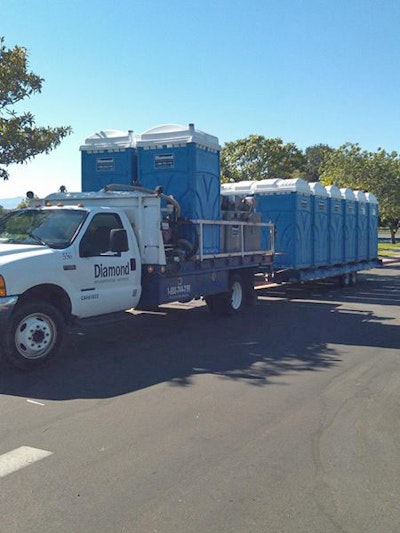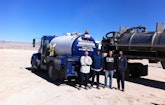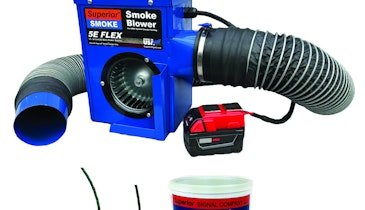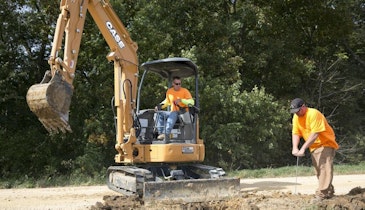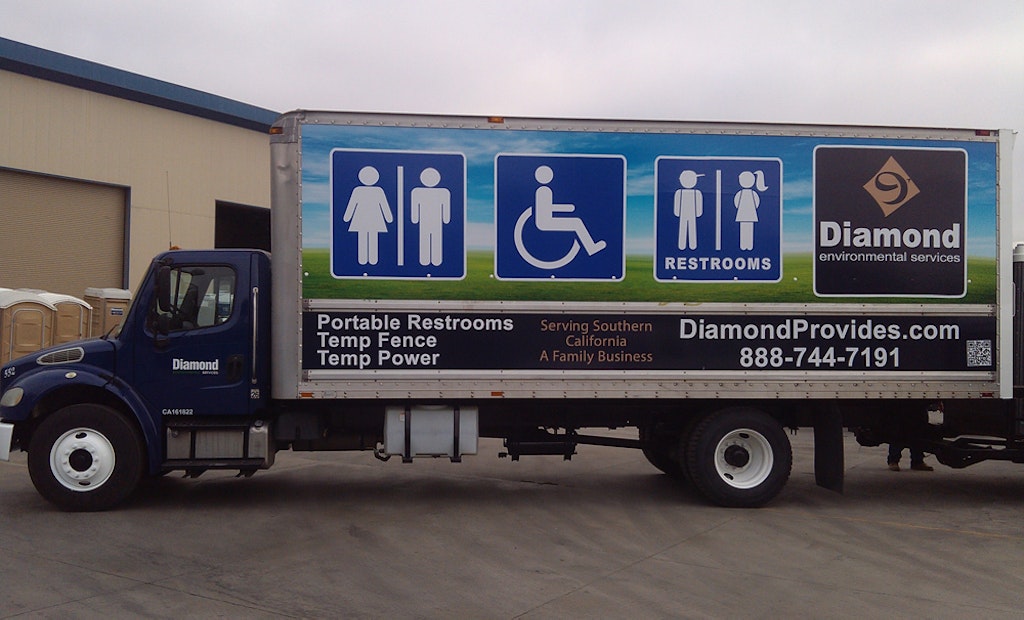
Interested in Portable Sanitation?
Get Portable Sanitation articles, news and videos right in your inbox! Sign up now.
Portable Sanitation + Get AlertsWe celebrate the continued dedication and hard work of septic service contractors by revisiting companies profiled 10 years ago in Pumper magazine. Check out the original story on Diamond Environmental Services company we featured in the April 2004 issue: “All According to Plan.”
Just six years into starting Diamond Environmental Services, owner Eric de Jong had grown his portable restroom business to keep 27 trucks and 67 employees busy when he was profiled 10 years ago.
Today, he has 200 employees and more than 140 vehicles in his fleet. The inventory that included 5,500 restrooms in 2004 has nearly doubled with 10,000-plus rental units (including sinks, etc.). Based in San Marcos, Calif., in a region of 24 million people, Diamond has expanded its service area from two counties to all of Southern California with six fully staffed yards. But successfully growing a company takes more than just being located in a high population area.
“We’ve grown a lot, but we haven’t changed much,” de Jong says. “We’re big enough to take care of anything, but small enough to answer the phone personally.”
Expanded services
“About half our growth has been through purchases and the other half is just internal growth,” de Jong says, noting he’s purchased about 10 portable restroom businesses since starting his business in 1998. They included single owners with one truck to larger companies with up to 30 employees. Reasons for selling varied from retirement to owners not interested in keeping up with California regulations.
Portable restroom rentals bring in more than 50 percent of Diamond’s income, and the business offers models for every need. Most models come in blue, the company’s signature color. But through acquisition of other businesses, they come from several restroom manufacturers. Most are Five Peaks, PolyPortables and Satellite Industries models. NuConcepts solar units with lighting, flushing and running water have also become very popular, and Diamond now has more than 400 units (compared to 55 units in 2004).
“Our footprint has expanded for people looking for more than standard restrooms,” de Jong says. “We don’t have any limits for markets and solicit all types of accounts.” The sales staff pursues agriculture, construction, military, city, school, municipal and event accounts including movie production.
With inventory ranging from heavy grade for construction to shower trailers to three levels of suites for wedding and events, Diamond is well equipped to meet demand. The business also rents sinks, temporary fence and power, storage and roll-off containers.
More recently, Diamond expanded into grease trap pumping and nonhazardous pumping and increased its number of septic pumping accounts. Between all the big cities in Southern California, there are many rural customers with septic tanks that need pumping. Technicians can do line jetting and make small repairs, but refer other businesses for large septic repairs.
California challenges
As a native Californian, de Jong laughs that he is used to getting beat up by California’s regulations.
One of the most expensive is a stringent emissions law that requires vehicles to be 2010 or newer to meet the requirements. Diamond has already replaced 70 vehicles. The new fleet includes Kenworth and Hino trucks. Most of the tanks are stainless or aluminum 1,000-gallon waste/400-gallon freshwater made by So-Cal Tank out of Chino, Calif. Diamond also has trucks with larger 1,500- to 6,000-gallon tanks for septic pumping.
California laws have also increased costs in other areas including labor, human resources and insurance, which make the cost of doing business more expensive. Waste disposal fees have increased, too.
“When it comes to pricing, we must be flexible with the times,” de Jong says. “It’s all based on the cost of doing business, economy and competition. So far we have been able to weather the storms.”
Maintaining standards
A human resource staff helps Diamond stay on top of state law regarding hiring procedures, screening and drug tests, to meet the challenge of hiring good employees. Many are bilingual, which is helpful in the region.
But beyond state law, Diamond has standards of its own to maintain quality service and a good reputation. For example, restrooms are inspected for damage, repaired if necessary and then thoroughly power washed before being moved to another site. Staff at each of the locations trains workers for the jobs they are doing in that area.
To keep track of the details, de Jong invested in PC Scale Tower software, which handles everything from mapping to tracking inventory and billing. Drivers also use smartphones or GPS devices.
“Some upgrades are difficult,” de Jong says. “But if you want to grow, you need to make changes.”
Diamond’s website lists the company’s services, provides information and fun facts, and helps customers get quotes and pay bills online — in English and Spanish. Sales staff uses social media and email marketing to attract new customers.
From office staff to technicians in the field, Diamond focuses on three guiding principals: simplicity, reliability and personal attention.
Better and bigger
Size has its advantages, de Jong says.
“We’re big enough to deal with pretty much any type of venue or project. We’re versatile enough to go out and buy any equipment a customer needs and take that risk. But we’re small enough we don’t have to go back to corporate or to a group of investors and have to deal with those type of politics. We try to stay local,” he explains.
“The cover story (in 2004) was called ‘All According to Plan,’ ” and it is pretty much dead on,” he adds. “This was the dream I had in regards to our service area and expanding and the growth of the company. What we have is a little more than what I had planned. We are young enough and local enough to adapt.”
The 47-year-old entrepreneur says he’s not interested in expanding beyond California. There is plenty of work for him and his competition in Southern California.
“There’s enough people in this part of the country to keep our company plenty busy,” de Jong says. “We will continue the services we have and get better at them.”
